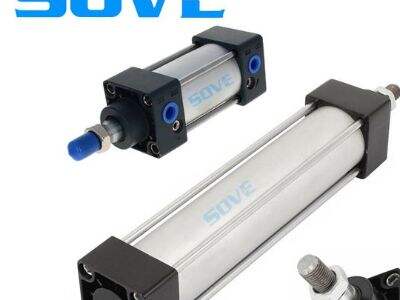SOVE pnevmatik aktuatoringizda muammolar yuz berayaptimi? Javobni kengaytiring. E'tibor bering! Quyidagi oddiy savollar har kuni muammolarni qadim-qadimga hal qilish uchun berilgan.
Tashqi va ichki yoyalarini topish va to'g'irlash
Agar pnevmatik aktuatoringiz to'g'ri ishlamayotganiga e'tiboringiz bo'lsa, u yuqishi mumkin. Yuqish aktuatorning quvvatini yo'qotishi sabab sifatli ishlamaydi. Yuqishni aniqlash uchun oddiy usuldan foydalanishingiz mumkin — sabunli suv! Sabun olish va uni suvga qo'shing, keyin uni aktuatorning havoduchlariga sharoitlang. Yuqishni aniqlash uchun suvdagi chiroqlar paydo bo'ladi. Shunda yuqish joyini topgan bo'ling, uning o'rnatilgan qismidagi pichoqlar yoki o-ringlarni almashtirishingiz mumkin.
Siz aktuatorning boshqa qismlarini xushki chiqqanligi uchun ham tekshirishingiz kerak. Bu eski yoki buzilgan joylarni topishga qaramaydi. Ushbu bo'limlarni tekshirish sizga yangi suzilmalardan oldin chaqirish va aktuatoringizni to'g'ri ishlashini saqlashda yordam beradi.
Chaqirgan vavalar bilan ishlash
Ushbu holatda pnevmatik aktuator ishlamay olishi mumkin. Qanday qilib bu sodir bo'lganini tushunsangiz, muammoga yechim topish osonroq bo'ladi. Birinchi tekshirish nuqtasi vava ulanishlari o'zi bo'ladi. U ochiq yoki noma'lum usulda emasligiga diqqat yetiring. Agar vava qotirma bo'lsa, uning ustidan yumshoq mittani yoki tortikka olib uni tozalashingiz mumkin.
Buning tashxisida boshqa bir narsani urinib ko'rishингиз мумкин: agar vava hala chaqirsa, shu jihatdan yangi vava kerak bo'lishi mumkin. Xavfsizlik har doim birinchi o'rinda, uni unutmang! Vava ustida har qanday ish bajarishdan oldin havani ta'minoti to'xtating. Shunday qilib, muammo yechilayotgan paytda siz o'z-o'zingizni zaxmir bo'lmaysiz.
Aktuatoringiz to'g'ri ishlay tushunish uchun qanday isbot qilish mumkin
SOVE pnevmatik aktuatoringiz to'g'ri ishlashi uchun muhim bo'lgan to'g'ri xizmat. Aktuatorni soddalashtiring va rustdan saqlash va kam darajada xarajatga ega bo'lish uchun regulyar ravishda singar yiqiling. Rust: Rust faqat rang o'zgarishi kabi bo'lib, metallni buzib tashlaydi. Xarajat: Xarajat esa qism bir necha yomon bo'lib, yaxshimiy hisoblanmaydi.
Havo liniyalarini va bog'langichlarni ham ziyoratsiz yoki xarajat uchun tekshiring. Agar nima bir narsa xarajat yoki yengilayotganini ko'rsangiz, ularga bog'laning. Shuningdek, xizmat rejasi bo'yicha ishlab chiqaruvchi jadvaliga amal qiling. Bu aktuatorning talab qilmagan ziyorati oldini oladi va keyinchalik uning funktsionalligini davom ettiradi.
Boshqaruv tizimlari va kabellardan tekshirish
Endi, boshqaruv tizimlari va kabellashalar pnevmatik aktuatoringizning asosiy bo'limlaridan biridir va ular ham muammolar yaratishi mumkin. Ular nimaga ishlamayotgani sababini aniqlash uchun birinchi qadimgi amalingiz - kabel lashuvlarini tekshirish. Kabel va boshqa komponentlarning to'g'ri ulanib turganiga ishonchingizni tekshiring. Agar hamma narsa yaxshi ishlamoqda ko'rinadi, lekin muammolar hal qilinmasa, sizga boshqaruv tizimi va kabellashaning butuniyatlari almashtirilishi kerak bo'lishi mumkin.
Shuningdek, kabellasha jarayonida havo ta'mini doim O'TKAZILISHI kerak. Bu kichik qadam tuzatish haqidagi suhbatda sizi xavfdan himoyalaydi va avarialarni oldini olishga yordam beradi.
Judli bosimdan zayiflashishi
Lekin SOVE pnevmatik aktuatoringizni buzib tashlay oladigan eng katta dushman judli bosimdir. Ko'p bosim va impakt urinishlari aktuatorni zayiflashtirishi mumkin. Bunday holatni oldini olish uchun emissivity aktuatorida faoliyat jarayonida to'g'ri havo bosimi va torq foydalanilishi kerak; Torq sozlamalari ulanishlarning yorliqlik darajasini belgilaydi.
Shuningdek, aktuator chegaralari yechimini tekshirishimiz kerak, chunki aktuator zommidan yetarlicha yuk eksport qilinmoqda. Bu bosqichda, agar siz xosh emas yoki narsa noto'g'ri tushunilsa, havo to'qishini keyinchalik o'chiring. Agar muammo yechimi haqida isbot bo'lmasa, eng yaxshi harakat usuli mutaxassis bilan bog'lanishdir.


